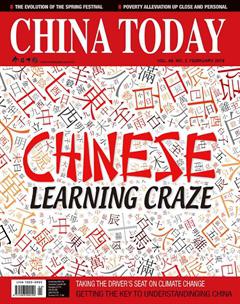Getting the Key to Understanding China
By staff reporter ZHANG HUI


THE third plenary session of the 11th Central Committee of the Communist Party of China(CPC), convened on December 18, 1978, unveiled Chinas epoch-making reform and opening-up.
In fact, Chinas reform and openingup, as a feat of human history, has not only deeply changed the country, but also greatly influenced the world. Part of the international community applauds the countrys great transformation over several decades and marvels at its incredible achievements. However, there are still some who have misgivings about the countrys development path and its role in the international community.
On December 16, the 3rd Understanding China Conference sponsored by the China Institute for Innovation and Development Strategy commenced in Beijing. Themed “Chinas New Growth Drivers and New Opportunities for Global Cooperation,” the three-day conference, with lots of international participants, tried to construe the countrys new development concepts, guiding principles, and resolve to advance its reform and opening-up in the new era. At the same time, it also serves as a good platform for the international community to know more about China, and get the key to understanding China. An attendee of the conference, former director-general of the World Trade Organization (WTO) Pascal Lamy sat down with China Today on the sideline, and shared his understanding of China.
China Today: The year 2018 marks the 40th anniversary of Chinas reform and opening-up. The world has witnessed Chinas tremendous changes and incredible development. What do you think about Chinas contribution to the world development? What has impressed you most about Chinas reform and opening-up?
Pascal Lamy: I think since Deng Xiaoping started this era of reform and openingup, it has worked overall extremely well, both for China and for the world. Although as we know, there have been moments when Chinas reform and opening-up accelerated and moments when it slowed down. Its a very good story overall, although there are issues which now need to be addressed.
The major success of China during these 40 years, thanks to its reform and opening-up, is the growth performance. China is the only country on this planet that has succeeded in growing its economy so big so fast. There is no other precedent, and there is no other comparable success like it in modern history. So this is the big asset of Chinas reputation, both domestically, because it has formidably reduced poverty in the country, and internationally because this is seen as a successful growth performance.
China Today: The conference youre attending is about understanding China. In your opinion whats the key to understanding China?
Pascal Lamy: I think the key is to know more about the way China has succeeded in growing its economy, know more about the relationship between its eco-nomic system and its political system, and know more about the Chinese civilization and Chinese values. The way Chinese think is not the way Europeans or Africans or Americans think. So understanding the difference is a major step forward in improving cooperation.
China Today: China has been advocating and following a policy of peaceful development. However, some parts of the Western world always tend to misinterpret Chinas strategic intention. Some people believe that the Thucydides trap is inevitable, which has consequently led to the introduction of the containment policy towards China. Whats your take about the issue?
Pascal Lamy: Well, I think youre right about the perception, most notably in the U.S. They take Chinas development as a threat, which is why Donald Trump changed the U.S. policy from containing China to pushing back China. They intend to reduce the growth of China, being afraid that Chinas rise may harm the U.S. interests. I dont think thats the right thing to do because it will harden China. While recognizing that in recent times China has become more assertive, it does not justify the U.S. stand, which I believe is too aggressive. But there are others in the West who also have changed their minds; they previously thought that the growth of China would make it converge with the Western model but now realize it has not happened as they expected.
China Today: China has played a more active role in global governance, evidenced by its proposal of the Belt and Road Initiative (BRI) and plans for some issues of global concern. What do you think about the BRI and Chinas role in global governance?
Pascal Lamy: I think the BRI is a very good and innovative concept. It was warmly received because it was seen as a move to enable more cooperation in building infrastructure, which can be used by everybody. However, I think for the moment, there are some doubts rising about the initiative in some countries as they see it as a China-only-driven process. While I agree that the BRI makes sense in expanding connectivity via infrastructures that allow China to breathe together with the rest of the world, I believe that if we want the initiative to progress, it should be demonstrated that the initiative is a two-or-three-way project.
In terms of global governance, China is doing great on environment. I think the world expects China to do more in other areas like security, finance, and trade.
China Today: Since Chinas accession to the WTO, Chinas business environment has improved remarkably with more market access available for foreign companies and its intellectual property right protection system has developed greatly. What do you think about Chinas changes and Chinas role in safeguarding the world multilateral trading system?
Pascal Lamy: I think China has fulfilled the commitments it took when it joined the WTO a long time ago. And Ive always said those who believe that China cheats with the rules are wrong. However, even though the rules of the game have not changed since 1994, the game has changed. China has become a much bigger player and this changes the game. Hence there is a need to improve the rules of the game, such as disciplines on subsidies in the WTO in order to relevel the playing field.

